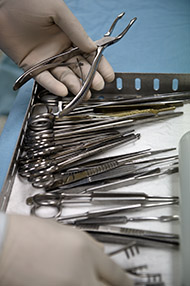Parkinson's Disease
PD & Surgical Admissions
PD and Surgical Admissions
The majority of patients with early PD can do well in hospital if they are given their medication and can swallow it - make sure they get it!
Zero tolerance for pharmacy code 4 in Parkinson's patients!
Zero tolerance for pharmacy code 4 in Parkinson's patients!
 But Parkinson's Disease patients are vulnerable in hospital, especially for surgery.
But Parkinson's Disease patients are vulnerable in hospital, especially for surgery.
- Medication gets missed
- Mobility and stiffness gets worse in bed or without normal medicines
- Swallowing declines; aspiration and pneumonia are common
- Nutrition at risk from poor hand dexterity and swallow
- Communication takes time – and worsens without medicines
- Delirium is common
Medication around surgery:
A PD patient will stiffen up without medication every few hours.
For well controlled, early PD patients:
- Prescribe their normal PD medication at their usual home timings (consider self-medication)
- Ensure medication is actually given – and on time
- Do not omit prior to surgery
- Restart as soon as possible afterwards
- Mobilise early
For complex patients, you need to contact the PD team urgently.
Click here for advice if patient is unable to take medicine orally.
Don't just omit medication:
When PD medications are withdrawn abruptly patients are at risk of developing
Neuroleptic Malignant Like Syndrome.
Special case: PD patients who have a Deep Brain Stimulator – DIATHERMY and MRI CAUTION

